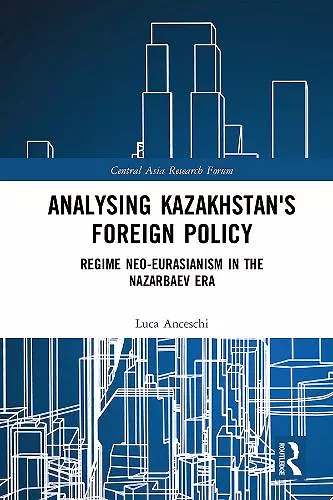Analysing Kazakhstan's Foreign Policy
Regime neo-Eurasianism in the Nazarbaev era
Format:Hardback
Publisher:Taylor & Francis Ltd
Published:28th Apr '20
Currently unavailable, and unfortunately no date known when it will be back
This hardback is available in another edition too:
- Paperback£41.99(9781032400280)

This book investigates the roles that ideas and constructs associated with Eurasia have played in the making of Kazakhstan’s foreign policy during the Nazarbaev era.
This book delves into the specific Eurasia-centric narratives through which the regime, headed by Nursultan Nazarbaev, imagined the role of post-Soviet Kazakhstan in the wider Eurasian geopolitical space. Based on substantive fieldwork and sustained engagement with primary sources, the book unveils the power implications of Kazakhstani neo-Eurasianism, arguing that the strengthening of the regime’s domestic power ranked highly in the list of objectives pursued by Kazakhstani foreign policy between the collapse of the Soviet Union and Nazarbaev’s apparent withdrawal from the Kazakhstani political scene (19 March 2019). This book, ultimately, is a study of inter-state integration, which makes use of a rigorous methodological approach to assess different incarnations of post-Soviet multilateralism, from the Commonwealth of Independent States to the more recent, and highly controversial, Eurasian Economic Union.
This book offers a ground-breaking analysis of Kazakhstani foreign policy in the Nazarbaev era. It will be of interest to students and scholars of Central Asian Politics, International Relations and Security Studies.
"Luca Anceschi needs little introduction as a well-published scholar of Central Asian affairs. [...] Analyzing Kazakhstan’s Foreign Policy provides a masterful account of the driving themes and issues with Kazakhstan’s foreign policy since its independence."
- Li-Chen Sim, Khalifa University, United Arab Emirates, Journal of Asian Security and International Affairs 8(2)
"[This book is] a very thorough analysis of the development of Kazakhstan’s leading foreign policy ideology, neo-Eurasianism, and its policy implications. [...] The author process-traces decision-making within the Kazakhstani government with great precision. Of great value are the emphasis on the nexus between foreign and domestic policies
and the many examples of how foreign policy has been used over the years in order to consolidate the power of the Nazarbaev regime domestically. Moreover, Anceschi explains the dynamics among the Central Asian states and how the unwillingness to limit their sovereignty hampered regional integration. The book provides not only a thorough academic study of integration processes in Central Asia, but also valuable insights into Kazakhstani decision-making processes. It can therefore be highly recommended to academics as well as decision-makers working on Central Asia, Kazakhstan and integration processes."
- Anastasia Vishnevskava-Mann, German Bundestag, Europe-Asia Studies 74:8.
“[…] the book provides an excellent analysis of Kazakhstan’s foreign policy, explaining the relationship between regime neo-Eurasianism and domestic politics. The author traces the development of foreign and domestic politics with great precision. The use of regime neo- Eurasianism by Nazarbayev to consolidate power at the domestic level and shape Kazakhstani nationhood remains an essential factor in the book. Moreover, Anceschi has done tremendous work elucidating Kazakhstan’s foreign policy posture overall. The book provides not only the details of Central Asian regionalism and integration process but is also a valuable contribution to Kazakhstan’s overall foreign policy decision-making. It can be recommended for a better understanding of Kazakhstan’s neo-Eurasianist paradigm and integration process.”
- Pranveer Bharti, Jawaharlal Nehru University, India. Central Asian Survey. 03 Apr 2025.
ISBN: 9780415711432
Dimensions: unknown
Weight: 453g
208 pages